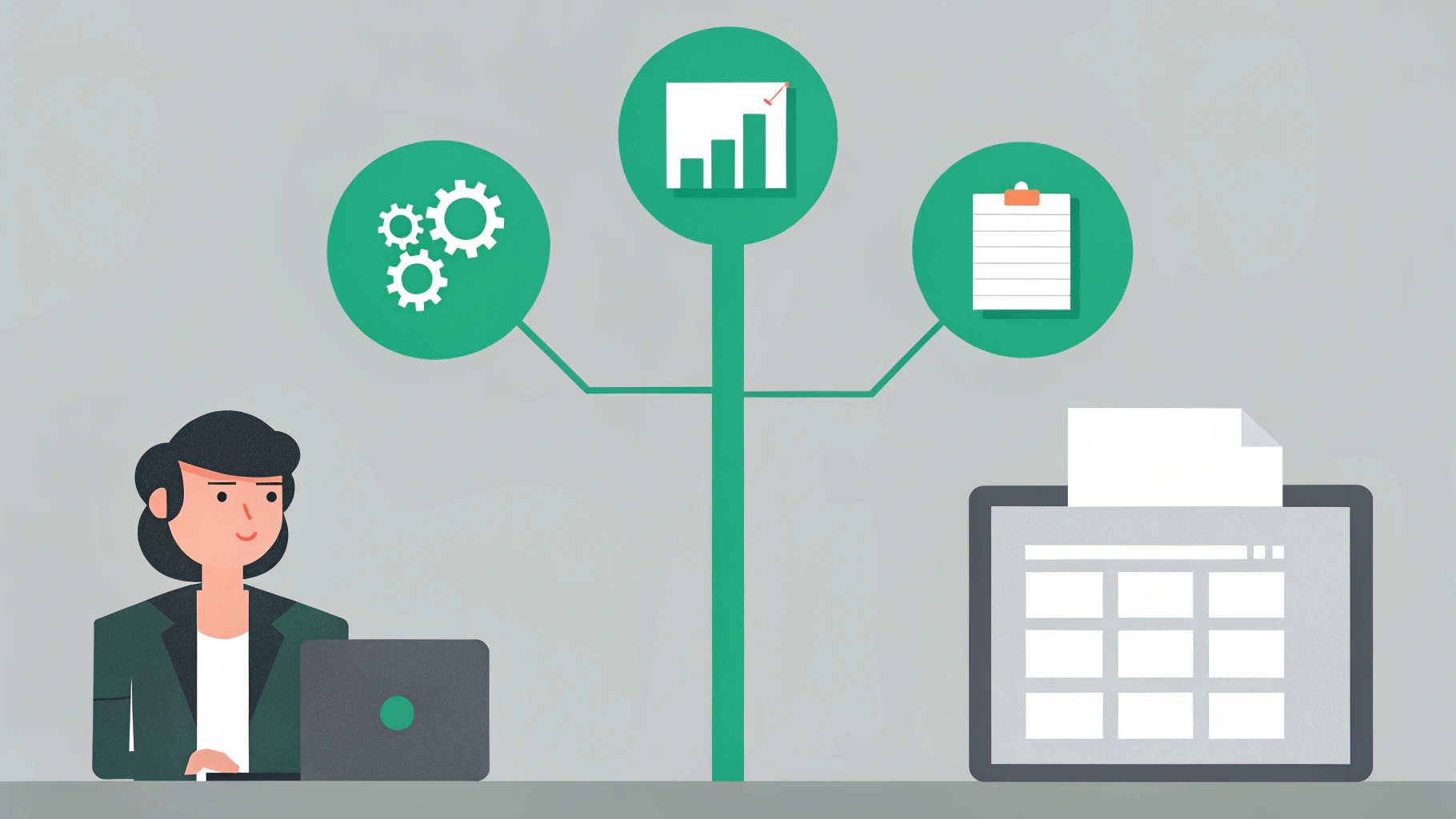Overview
An ERP accounting system is vital for business success, as it integrates core financial processes, enhances operational efficiency, and provides immediate access to accurate financial data. Such systems significantly reduce manual errors and improve compliance, leading to substantial ROI. This enables organizations to make informed decisions and maintain a competitive edge in a dynamic marketplace. By leveraging an ERP accounting system, businesses can streamline their financial operations, ensuring they remain agile and responsive to market changes.
Introduction
In an increasingly competitive business landscape, integrating technology into financial management has become not just a trend; it is a necessity. ERP accounting systems emerge as vital tools that streamline operations and empower organizations to make informed decisions through real-time data access. However, a critical question arises: how can businesses effectively leverage these systems to overcome common challenges and drive sustainable growth? Exploring the essential role of ERP accounting systems reveals their immediate benefits and their long-term impact on operational success and efficiency.
Define ERP Accounting Systems and Their Role in Business
The ERP accounting system comprises integrated software applications designed to manage and automate core business processes, particularly in finance and accounting. These frameworks consolidate information from various departments, providing immediate access to monetary details, which is essential for informed decision-making. By integrating functions such as accounts payable, accounts receivable, payroll, and budgeting, the ERP accounting system streamlines operations and significantly enhances efficiency.
For expanding distributors, these systems are indispensable, offering a cohesive platform that minimizes data silos and fosters collaboration among departments. This ultimately leads to improved resource management and operational success. Current statistics reveal that 92% of wholesalers and distributors utilize ERP software, underscoring its critical role in the industry. Furthermore, 53% of organizations report a positive ROI from ERP implementations, emphasizing the economic advantages of adopting such integrated solutions.
As industry leaders highlight, “89% of companies view accounting as the most vital ERP function,” demonstrating the key role of resource management in ERP solutions. Additionally, ERP reduces manual errors by 70%, enhancing operational precision. Notably, 85% of firms believe that outdated information leads to poor business decisions, highlighting the necessity for immediate access to accurate information.
In summary, the ERP accounting system is essential for distributors aiming to enhance financial management and achieve operational success. By investing in these integrated systems, organizations can ensure they remain competitive and efficient in an ever-evolving marketplace.
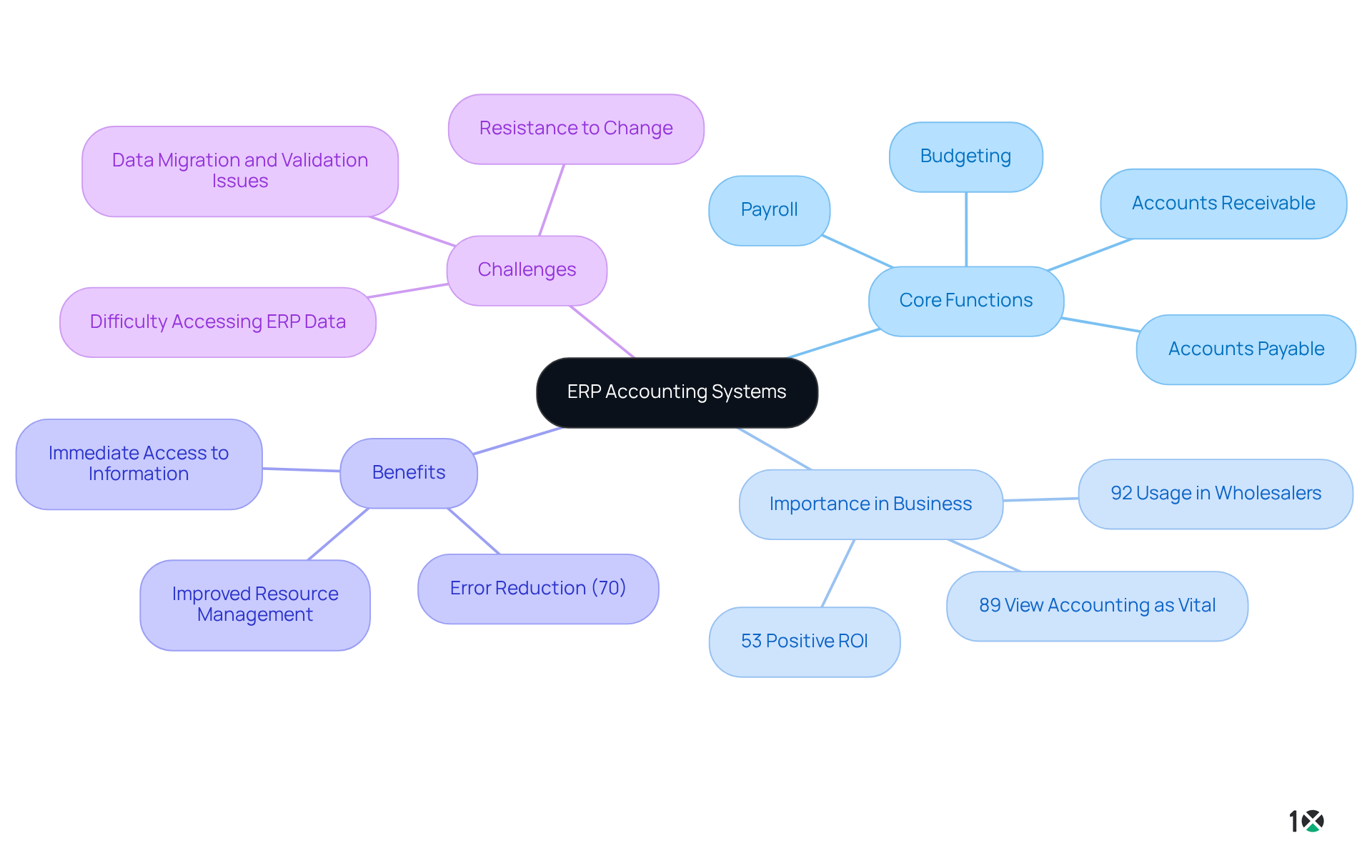
Explore the Key Benefits of ERP Accounting Systems
The primary advantages of the ERP accounting system include improved data precision, enhanced reporting, and increased operational efficiency. By automating routine tasks such as invoicing and expense tracking, these solutions minimize human error and save valuable time.
For example, organizations that have implemented ERP solutions have reported an average reduction in invoicing time of up to 50%, enabling finance teams to concentrate on strategic initiatives rather than manual processes.
Additionally, ERP solutions provide extensive reporting functionalities, allowing companies to generate real-time financial insights that support strategic planning. Statistics indicate that companies utilizing an ERP accounting system experience a 20-30% improvement in data accuracy, with 89% of organizations identifying accounting as the most critical ERP function.
Moreover, the integration of various business functions into a single platform promotes collaboration and transparency, both of which are vital for effectively scaling operations.
A recent study by Nucleus Research revealed that the majority of companies reported a return on investment exceeding 150% after transitioning to a Cloud ERP solution, underscoring the value of these solutions in today’s business landscape.
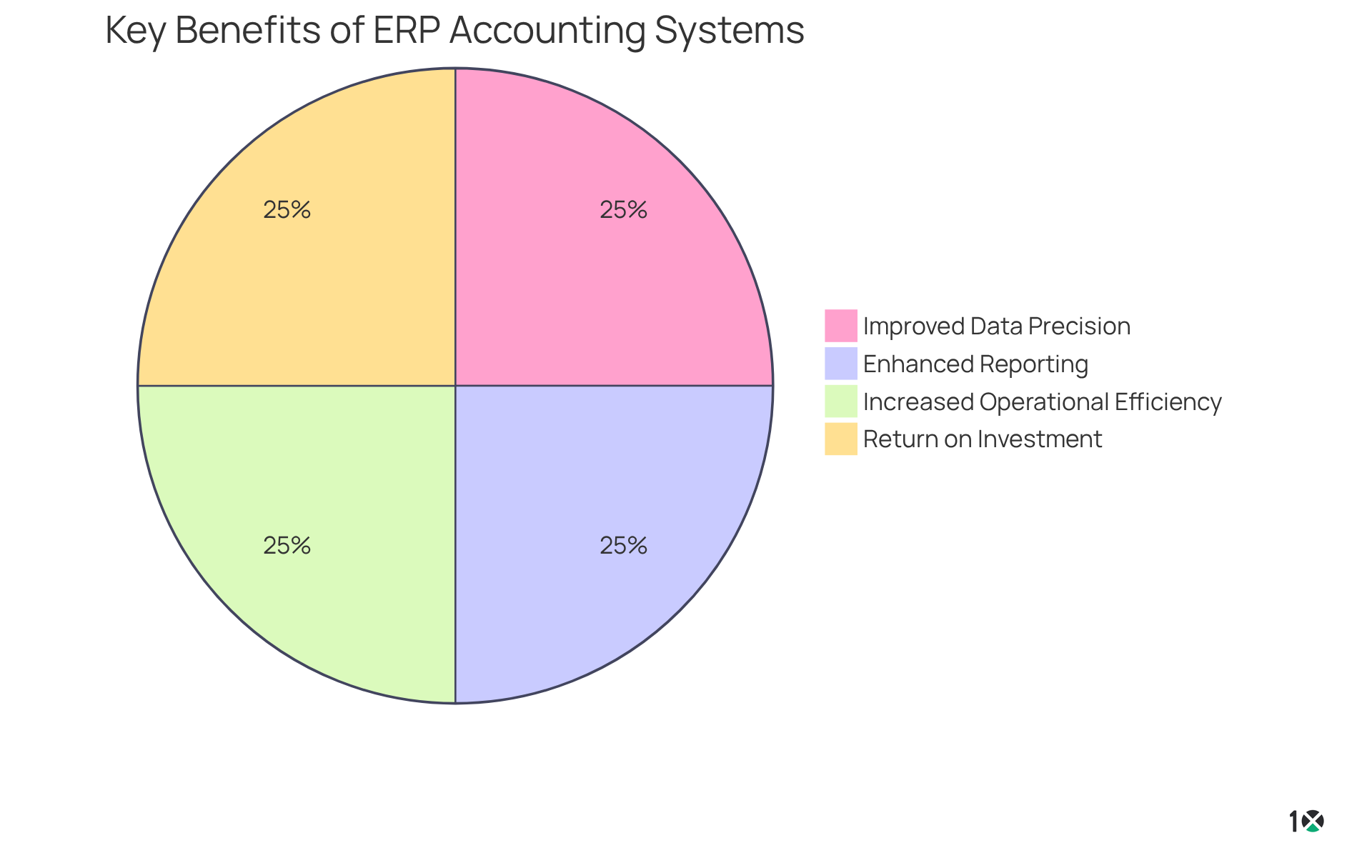
Identify Common Challenges Addressed by ERP Accounting Systems
ERP accounting systems are pivotal in tackling prevalent challenges faced by businesses, especially within the distribution sector. One significant issue is information fragmentation, where details are scattered across various platforms, leading to inefficiencies and elevated error rates. Research indicates that organizations without ERP solutions often encounter information silos, hindering decision-making and operational effectiveness. By consolidating financial data, the ERP accounting system eliminates reliance on multiple software tools, thereby minimizing the likelihood of discrepancies and errors. Notably, 92% of wholesalers and distributors have embraced the ERP accounting system to optimize operations, underscoring its importance in the industry.
Moreover, the ERP accounting system automates compliance monitoring and reporting, which is vital for meeting regulatory requirements. For instance, a distributor utilizing an ERP solution can swiftly generate reports that adhere to accounting standards, significantly reducing the time and effort needed for audits. This automation not only improves accuracy but also enables businesses to concentrate on strategic initiatives rather than becoming mired in manual processes. Research shows that 75% of organizations have improved compliance through an ERP accounting system, and those utilizing the ERP accounting system experience a 74.3% enhancement in productivity and efficiency, illustrating the transformative impact of integrated financial management on operational success. However, it is essential to recognize that implementing an ERP solution can pose challenges, including intricate data migration and integration with existing systems, necessitating careful planning and support.
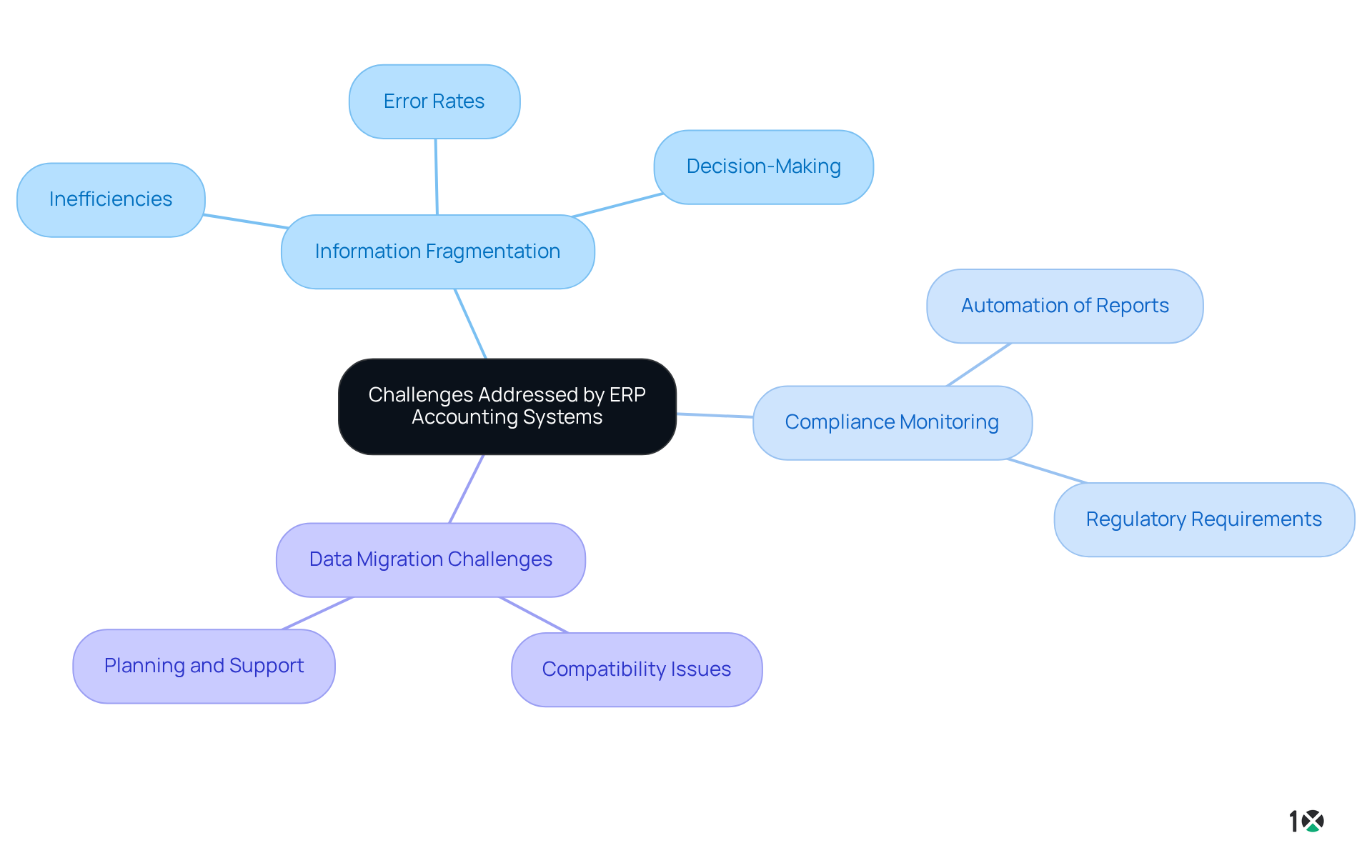
Analyze Long-Term Advantages of Implementing ERP Accounting Systems
Implementing an ERP accounting system presents numerous long-term benefits that can significantly influence a business’s growth trajectory. One of the most notable advantages is scalability; as a distributor expands, an ERP solution can adapt to increased transaction volumes and additional functionalities without necessitating a complete redesign. Furthermore, ERP solutions enhance data-informed decision-making by providing historical data analysis and predictive features, which are vital for strategic planning. Over time, companies that leverage ERP solutions often witness improved customer satisfaction due to superior inventory management and order fulfillment processes. This competitive edge can lead to increased market share and profitability, solidifying the ERP system’s role as a cornerstone of operational success.
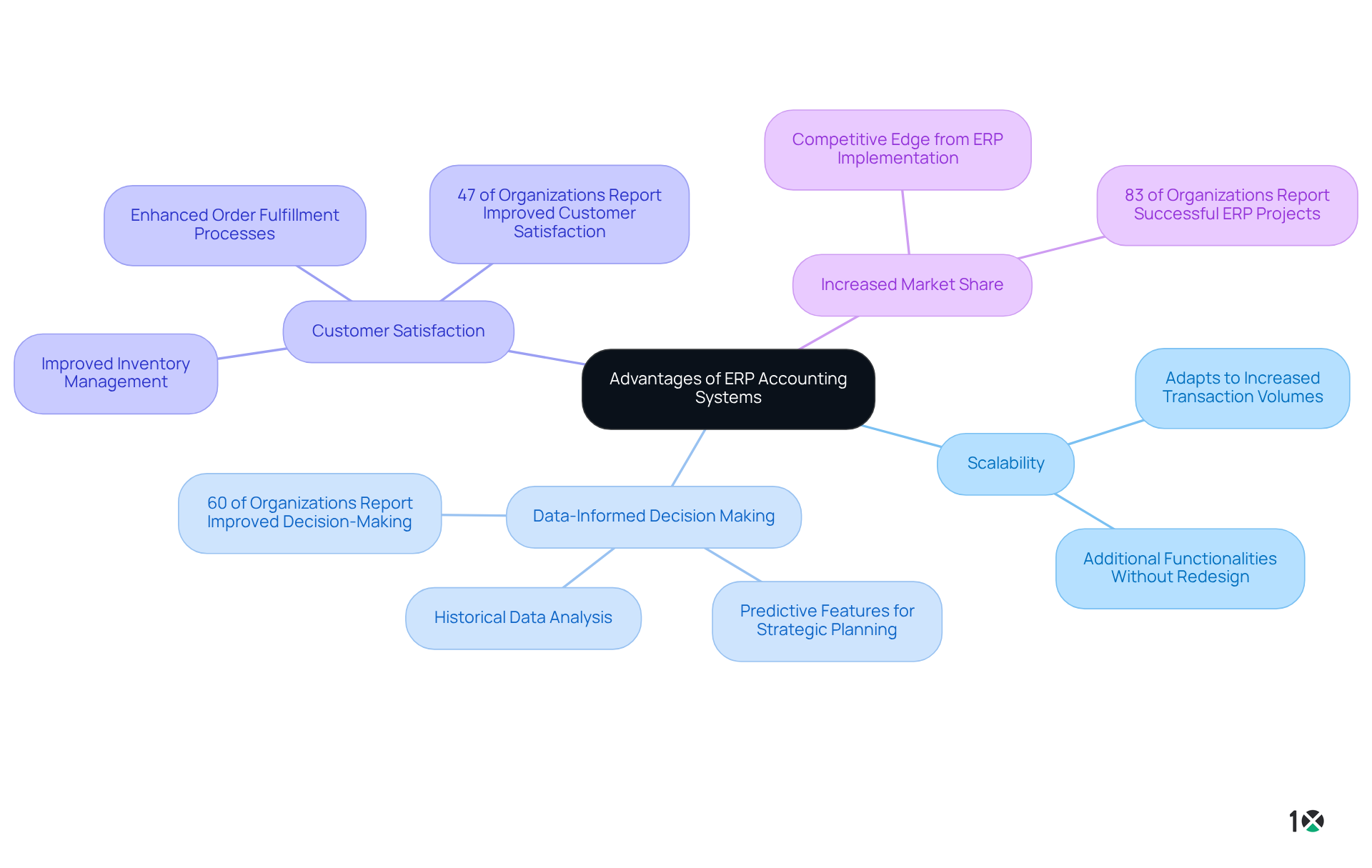
Conclusion
The significance of ERP accounting systems in achieving business success cannot be overstated. These integrated solutions are vital for streamlining financial management, enhancing operational efficiency, and fostering collaboration across departments. By consolidating data and automating processes, ERP systems empower organizations to make informed decisions swiftly, which is essential in today’s competitive landscape.
Key benefits of ERP accounting systems include:
- Improved data accuracy
- Enhanced reporting capabilities
- Increased productivity
The ability to reduce manual errors and provide real-time insights allows businesses to focus on strategic initiatives rather than being bogged down by routine tasks. Moreover, challenges such as information silos and compliance issues are effectively addressed through these systems, demonstrating their transformative impact on operational success.
In a rapidly evolving business environment, the long-term advantages of implementing ERP accounting systems are clear. Companies that embrace these solutions not only enhance their scalability and adaptability but also improve customer satisfaction and market competitiveness. As businesses look toward the future, investing in an ERP accounting system is not just a strategic move but a necessary step toward sustained growth and efficiency in an increasingly complex marketplace.
Frequently Asked Questions
What is an ERP accounting system?
An ERP accounting system comprises integrated software applications designed to manage and automate core business processes, particularly in finance and accounting.
What are the main functions of an ERP accounting system?
The main functions include managing accounts payable, accounts receivable, payroll, and budgeting, which streamline operations and enhance efficiency.
Why are ERP accounting systems important for expanding distributors?
They provide a cohesive platform that minimizes data silos and fosters collaboration among departments, leading to improved resource management and operational success.
What percentage of wholesalers and distributors utilize ERP software?
Current statistics reveal that 92% of wholesalers and distributors utilize ERP software.
What is the reported ROI from ERP implementations?
53% of organizations report a positive ROI from ERP implementations, highlighting the economic advantages of these integrated solutions.
How do companies perceive the role of accounting in ERP systems?
89% of companies view accounting as the most vital ERP function, demonstrating its key role in resource management.
How does ERP impact manual errors in business processes?
ERP reduces manual errors by 70%, enhancing operational precision.
What is the effect of outdated information on business decisions?
85% of firms believe that outdated information leads to poor business decisions, emphasizing the necessity for immediate access to accurate information.
Why should organizations invest in ERP accounting systems?
Investing in ERP accounting systems is essential for enhancing financial management and achieving operational success, helping organizations remain competitive and efficient in a changing marketplace.
